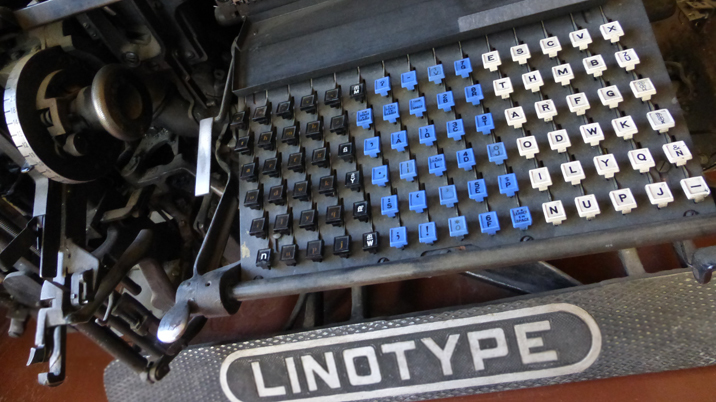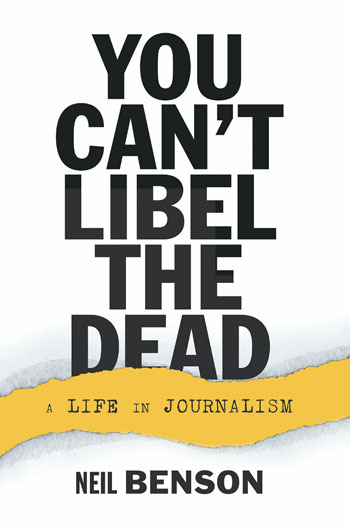
In his recently published memoirs, Neil Benson, former editorial director of Trinity Mirror, opens with the wisdom he received as a 19-year-old trainee reporter on his hometown paper, The Star in Sheffield.
“The pay’s crap, but you will have a few laughs,” the seasoned colleague promised.
He had started on £24 a week, a fiver less than he had earned a year earlier as a council bin man.
‘You Can’t Libel the Dead: A Life in Journalism’ demonstrates there were indeed plenty of laughs, mayhem and excitement. Later, as editor of both the Coventry Evening Telegraph and Newcastle Evening Chronicle – “the best jobs I felt most privileged to have” – before ending up at what it now Reach, the pay probably didn’t turn out too bad either.
For Benson the reporter, his most exciting story started when his news editor woke him at 1am on a snowy night with a tip. There was a lot of police activity outside the Highwayman pub high on the moors between Chesterfield and Baslow.

Off he went in his VW Beetle and duffle coat and walked straight into covering the Pottery Cottage murders. An escaped prisoner on the run, Billy Hughes, took Gill Moran hostage up towards the moors, after, it turned out later, having murdered four members of her immediate family in the cottage.
Hughes was about to kill Moran with an axe when he was shot dead by police.
“At the age of 22, I had covered the biggest story of my reporting life,” says Benson who regarded reporters as the Cavaliers of journalists compared with the subs – the humourless Roundheads.
Unexpectedly, Benson was soon to become one of those Roundheads, after only four years as a Cavalier, because of a shortage of subs at The Star, and then found that the subbing and editing life suited him very well.
Remembering the Linotype
While the stories are good, the importance of ‘You Can’t Libel the Dead’, partly created because of the time that opened up during Covid lockdown, is that Benson’s working life coincided with the great transition – and disruption – that has stretched all the way from hot metal Linotype machines to the devastating impact on publishing and journalism of the tech giants of California.
As a visiting professor of journalism at Huddersfield University, he often opens his lectures with a picture of a Linotype and none of his students have the faintest idea what it is.
Benson believes that the Linotype machine survived for 100 years, before becoming a museum piece, because it was “a good piece of kit” but also because the newspaper business was in such a solid position that it could afford not to innovate “and chug along with old technology”.
Could, should, the newspaper industry have done better in the face of the coming “great disruption?”.
Benson believes there was the classic incumbency problem after nearly a century of “roaring success”.
Many, particularly in the regional newspaper industry, convinced themselves that the threat of online was going to be one of those normal cyclical changes, rather than “a once and forever change”.
At the same time, many senior executives were nearing the end of their careers and were ill-equipped for such a challenge, never having encountered such a thing before.
One of the exceptions, according to Benson, was Philip Graf, then chief executive of Trinity Mirror, who saw what was going to happen and persuaded the board to make a very substantial investment in digital.
Then the first internet bubble burst and when, a while later it became clear that the internet was not going to go away, in terms of dealing with boards and shareholders “Philip was probably quite constrained by that experience”.
One out of sixteen
Benson recalls that only the first of his sixteen years at Trinity Mirror was “normal” when he was able to concentrate on such tasks as working with editors on product development and redesigns.
His next fifteen years would be spent trying to find a way to navigate through what the internet was doing to the business.
A lot of that attempted solution involved cutting the two main costs of publishers – newsprint and people. Reduce the size of papers and fewer editorial staff are needed, even if such restructures inevitably also involve pain.
The Benson approach, he says, was to “be as honest with staff as you could be and include training and development for journalists to help equip them for the future. It was tough and didn’t get any easier over the years.”
There were times, Benson admits, when he was worried that the cuts would actually break the business, that the restructuring would dilute what was being offered in terms of editorial quality.
“In hindsight, you can actually say we should have gone a bit further than we did,” Benson now admits.
“Who can say whether we could have done more but the pressure was on. It wasn’t a case of trying to do the same with fewer people, it was actually doing more, a lot more,” Benson adds.
But he salutes incredibly driven, focused journalists who just rolled with the pressure of moving to a 24-7 digital world after generations of 12-hour analogue split shifts.
“No-one is in it for the money,” Benson adds almost unnecessarily.
Benson concedes that he was often given a hard time by journalists because of the cuts he believed had to be imposed.
“But if you could convince them (the journalists) that something had to happen, they very quickly switched to how are we going to make this work. They are very pragmatic people and I felt quite humbled by that,” says Benson.
“Journalists love the industry and love the titles that they work for and that shone though,” he adds.
The big question
After a pause, the former newspaper executive returns once more to the biggest conundrum of his professional life – could more have been done in the face of the digital revolution?
Maybe people who spent a lifetime in print were too tied to print, he suggests, when the writing was already on the wall and as a result they didn’t move quickly enough on digital.
“More should have been invested. There should have been a quicker realisation that it’s not about the paper and ink, it’s about news and journalism – be less attached to platform and more attached to the news you produce,” Benson concludes.
The former executive believes “the water is still choppy” for the publishing business.
After all the pain of the restructurings, things had begun to even out and then came the additional blows from the pandemic and increasing costs of newsprint resulting from the war in Ukraine.
Benson is also concerned about growing threats to journalism, and cites everything worrying, from politicians such as now Prime Minister Liz Truss avoiding interviews with Andrew Neil or Nick Robinson in the leadership campaign to revelations that the College of Policing want police to log any contact with journalists as if such relationships were dangerous.
Overall, Benson worries about organisations either ducking their responsibilities to be open or trying to marginalise or discredit the press.
One unresolved matter that could boost British journalism is the issue of a greater contribution from the tech giants such as Google.
“There is no doubt that they have stripped away huge swathes of advertising revenues, particularly from the regionals, but from any publisher. They benefit from content that publishers pay to gather and then take their advertising revenue as well,” Benson argues.
“Eventually that could be the death of the news industry and everyone loses at that point,” he concludes.
What the tech giants contribute at the moment is “small beer” and more concerted pressure is needed to persuade them to pay more and “create a model that gives the industry some kind of certainty”.
Ultimately, it may be a matter for government and taxation but whatever the solution, Benson believes, in an uncertain world, that solution has to be permanent and one that allows publishers to build a sustainable future.
Editorial standards
Since leaving fulltime journalism, one of Neil Benson’s roles, apart from supporting Wrexham FC where he now lives, is to chair the editor’s code committee of the Independent Press Standards Organisation. He took over in 2017 from Daily Mail editor-in-chief Paul Dacre.
“We have tried to address issues as they have arisen. The code has been around for 30 years and it has never stood still. Our aim has been to be aware of societal changes,” Benson explains.
Recent changes have evolved, showing greater sensitivity about the reporting of suicides to try to avoid copycat deaths and greater awareness about gratuitous reporting of mental health issues.
As a result, it would be unlikely that an historic headline about the boxer Frank Bruno, “Bonkers Bruno,” would make it into print these days.
One of the hottest debates at the moment concerns trans-rights. The committee has been approached by those on both sides of the argument but has decided not to move before there has been a reasoned debate and discussion on the subject.
“We feel we shouldn’t move too quickly on this because history may find we have made a false step,” Benson says cautiously.
In his book, Neil Benson concludes with a tribute to the current generation of journalists who produce far more content than his generation ever did across an array of media platforms. At the same time, they are smart, highly skilled, prolific, endlessly adaptable, quick to learn and remarkably resilient.
“I take my hat off to them and wish then every success. And as they make their way in the industry I love, I hope they have more than their fair share of fun,” says Benson who makes no comment on how much they are paid.
Yes, but would he recommend a child of his own becoming a journalist now?
When Benson’s son Rory asked to do work experience at the Manchester Evening News when he was 17 the elder Benson marked his card about how rocky the industry was.
Rory Benson went quiet for a few seconds before saying: “But Dad, it’s what I want to do.”
Rory Benson is now deputy social media editor at The Sun.
Neil Benson (neil.benson54@gmail.com) writes: “I was probably one of the last journalists to learn Pitman shorthand - it was well on the way to being replaced by Teeline when I learned it in 1973-4. In my book, there's a picture of a couple of lines of Pitman, written by me, which contains a mildly humorous hidden message (see below). I'd be happy to send a signed copy of the book to the first InPublishing reader who can transcribe my shorthand accurately.”

You Can’t Libel the Dead: A Life in Journalism, by Neil Benson, is published by Takahe Publishing, priced £10.95.

This article was first published in InPublishing magazine. If you would like to be added to the free mailing list to receive the magazine, please register here.












